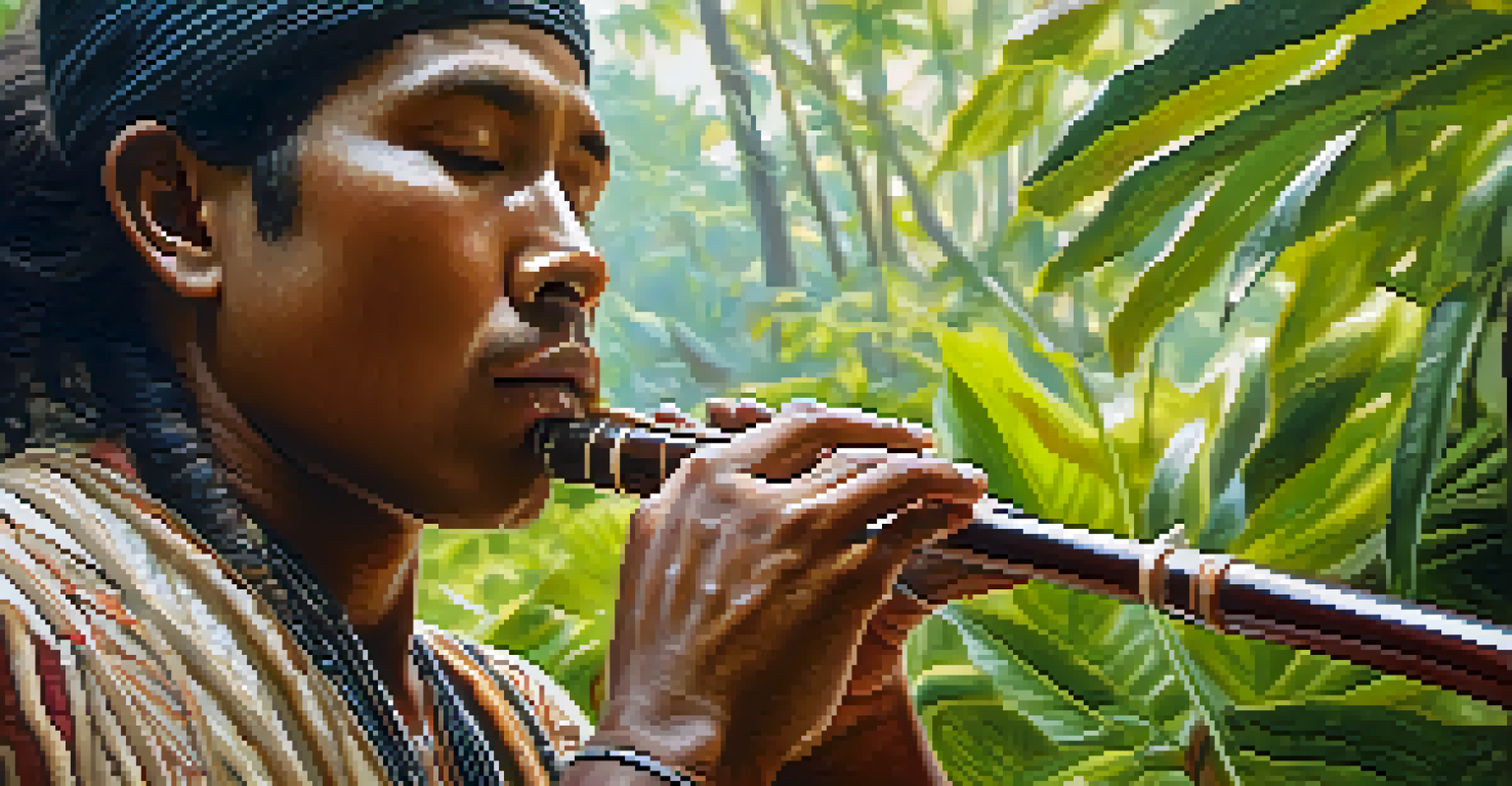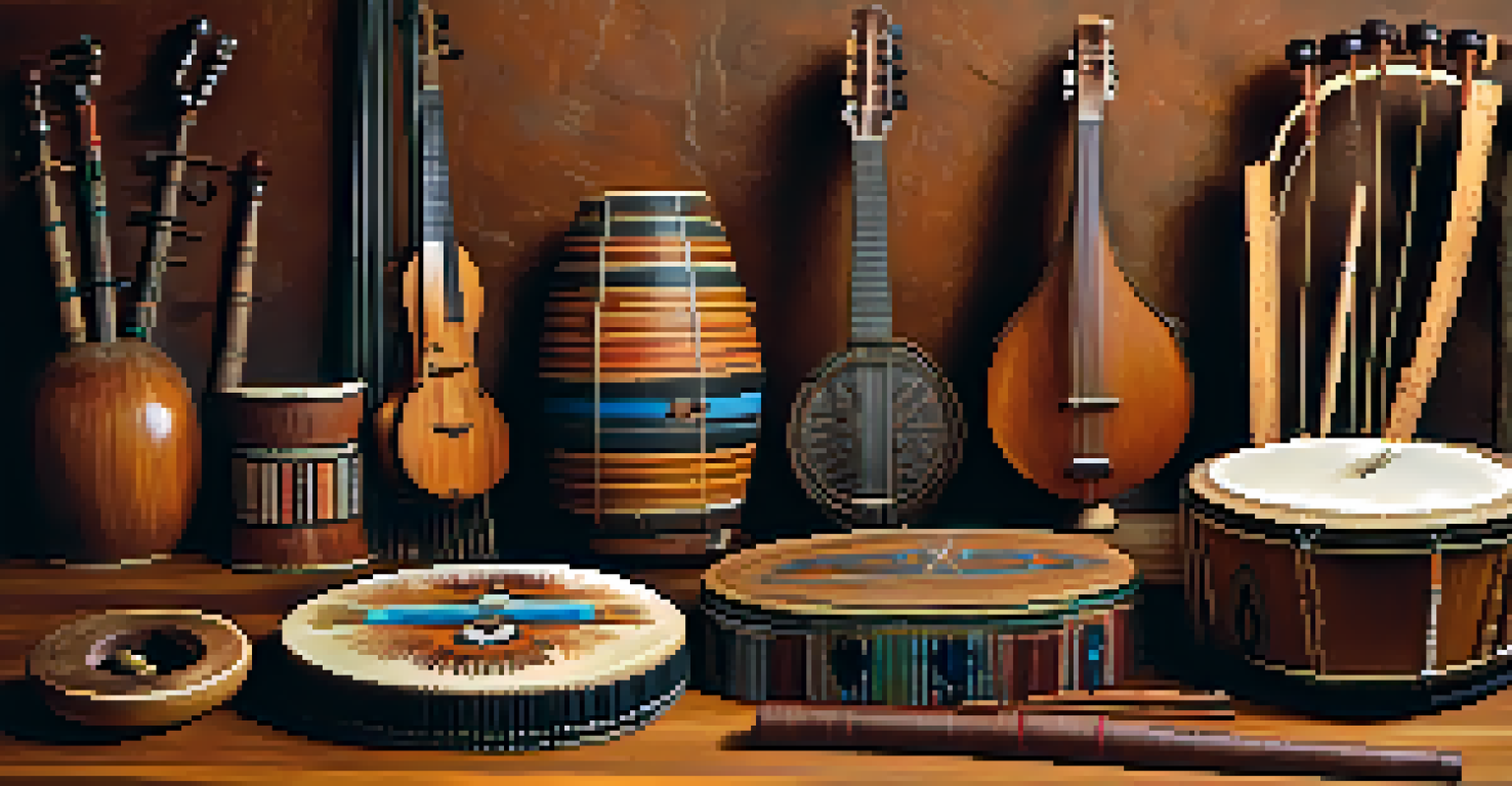The Impact of Cultural Appropriation on Indigenous Music

Understanding Cultural Appropriation in Music
Cultural appropriation refers to the adoption of elements from one culture by another, often without understanding or respecting their significance. In the realm of music, this can manifest when artists borrow styles, instruments, or lyrics from Indigenous cultures while failing to acknowledge their origins. This practice raises ethical questions about ownership, authenticity, and respect for cultural heritage.
Cultural appropriation is often seen as a one-way street, where the dominant culture takes from the marginalized without giving anything back.
Unlike cultural exchange, which involves mutual sharing and respect, appropriation often results in the commodification of music. For instance, when mainstream artists incorporate Indigenous sounds into their work without proper credit, they risk diluting the cultural significance of those elements. As a result, Indigenous musicians may feel their art is being exploited rather than celebrated.
Understanding the fine line between appreciation and appropriation is crucial. While sharing music can foster connections, it is vital to approach Indigenous music with a mindset of respect and recognition of its cultural roots. This creates a more equitable landscape where Indigenous voices are heard and valued.
The Historical Context of Indigenous Music
Indigenous music has deep roots, often tied to rituals, storytelling, and cultural identity. These traditions have been passed down through generations, encapsulating the history and experiences of Indigenous peoples. However, colonization and cultural suppression have disrupted these practices, leading to a struggle for preservation and recognition.

When outside influences appropriate Indigenous music, they can overshadow its original meanings and contexts. For example, the use of Native American chants in pop music often strips away their significance, reducing them to mere sound effects. This not only disrespects the culture but also perpetuates stereotypes and misconceptions about Indigenous peoples.
Cultural Appropriation vs. Exchange
Cultural appropriation involves borrowing from Indigenous cultures without respect or acknowledgment, contrasting with genuine cultural exchange that emphasizes mutual respect.
Reclaiming Indigenous music is essential for cultural revitalization. By promoting Indigenous artists and their authentic expressions, communities can combat the impacts of appropriation and foster a deeper understanding of their rich musical heritage. This reclamation also empowers Indigenous voices, allowing them to share their stories on their own terms.
The Monetary Impact of Cultural Appropriation
Cultural appropriation often leads to financial benefits for those who borrow from Indigenous cultures, while Indigenous artists may struggle to find the same opportunities. For instance, when a popular artist samples Indigenous music, they can achieve commercial success, but the original creators may not see any of those profits. This imbalance raises important questions about fairness and equity in the music industry.
Music is a powerful tool for connection, but it can also be a weapon of cultural erasure if not approached with respect.
Moreover, the commercialization of Indigenous music can lead to the creation of stereotypes and misrepresentations. When Indigenous sounds are used solely for profit, the narrative often shifts to fit mainstream trends rather than honoring the original intent. As a result, Indigenous communities may feel further marginalized, as their cultural expressions are turned into mere commodities.
To address these disparities, it's essential to advocate for fair compensation and recognition for Indigenous musicians. Supporting Indigenous-owned labels and platforms can help ensure that profits from their music go back to the communities that created it. This shift not only fosters economic empowerment but also promotes a more respectful engagement with Indigenous culture.
The Role of Education in Combating Appropriation
Education plays a crucial role in addressing cultural appropriation in music. By raising awareness about the significance of Indigenous music and its cultural context, we can foster a deeper appreciation among audiences. Educational initiatives can help dispel myths and promote understanding of the historical trauma faced by Indigenous communities.
Workshops, seminars, and online resources can provide valuable insights into the nuances of Indigenous music, emphasizing the importance of respect and collaboration. For instance, inviting Indigenous artists to share their stories can create meaningful connections and help bridge the gap between cultures. This approach encourages listeners to engage with Indigenous music on a more profound level.
Economic Disparities in Music
Indigenous artists often miss out on financial benefits when their music is appropriated, highlighting the need for fair compensation and recognition in the industry.
Moreover, integrating discussions about cultural appropriation into music education programs can equip future musicians with the knowledge they need to navigate these complexities. By fostering a sense of responsibility and respect, we can cultivate a new generation of artists who prioritize authenticity and cultural sensitivity in their work.
Showcasing Indigenous Voices in the Music Industry
In recent years, there has been a growing movement to amplify Indigenous voices within the music industry. Platforms dedicated to showcasing Indigenous artists are emerging, providing them with the opportunity to share their stories and perspectives. This shift not only empowers Indigenous musicians but also enriches the broader musical landscape with diverse sounds and narratives.
For example, festivals and events that focus on Indigenous artists create spaces for cultural exchange and appreciation. These gatherings celebrate the richness of Indigenous music while fostering connections between artists and audiences. By prioritizing Indigenous representation, we can challenge the prevailing narratives shaped by appropriation and highlight authentic expressions of culture.
Supporting Indigenous artists means choosing to listen to their music, attending their performances, and advocating for their inclusion in mainstream spaces. This active engagement can help shift the balance of power in the music industry, allowing Indigenous voices to thrive and be recognized for their contributions.
The Emotional Toll of Cultural Appropriation
Cultural appropriation can take an emotional toll on Indigenous artists and communities. When elements of their culture are used without permission, it can feel like a violation, stripping away the meaning and value of their traditions. This emotional impact is often compounded by a history of colonization and cultural erasure, leading to feelings of frustration and anger.
Indigenous musicians often express their experiences through their art, using music as a form of resistance and healing. By sharing their stories, they can evoke empathy and understanding from listeners. However, when their work is appropriated, it can undermine these efforts, making it challenging for them to reclaim their narratives.
Education's Role in Awareness
Educational initiatives about Indigenous music can foster appreciation and understanding, helping to combat cultural appropriation through informed engagement.
Creating spaces for dialogue about these emotional experiences is essential. By listening to Indigenous voices, we can better understand the impact of appropriation and work towards healing. This collective effort can foster respect and appreciation for Indigenous music, allowing it to be celebrated for its authenticity and cultural significance.
The Path Forward: Respectful Engagement with Indigenous Music
Moving forward, it’s essential to promote respectful engagement with Indigenous music. This means actively seeking out Indigenous artists and listening to their stories, rather than simply consuming their music for entertainment. By prioritizing authenticity and understanding, we can create a more inclusive musical landscape that honors diverse cultures.
Additionally, supporting initiatives that promote Indigenous music education can empower communities and foster appreciation. Collaborating with Indigenous musicians on projects that respect their cultural heritage can also lead to meaningful exchanges and enrich the creative process. These actions demonstrate a commitment to valuing Indigenous voices and perspectives.

Ultimately, the goal should be to create a space where Indigenous music is celebrated and respected. By acknowledging the complexities of cultural appropriation and actively working against it, we can contribute to a more equitable and respectful music industry that honors the richness of Indigenous cultures.